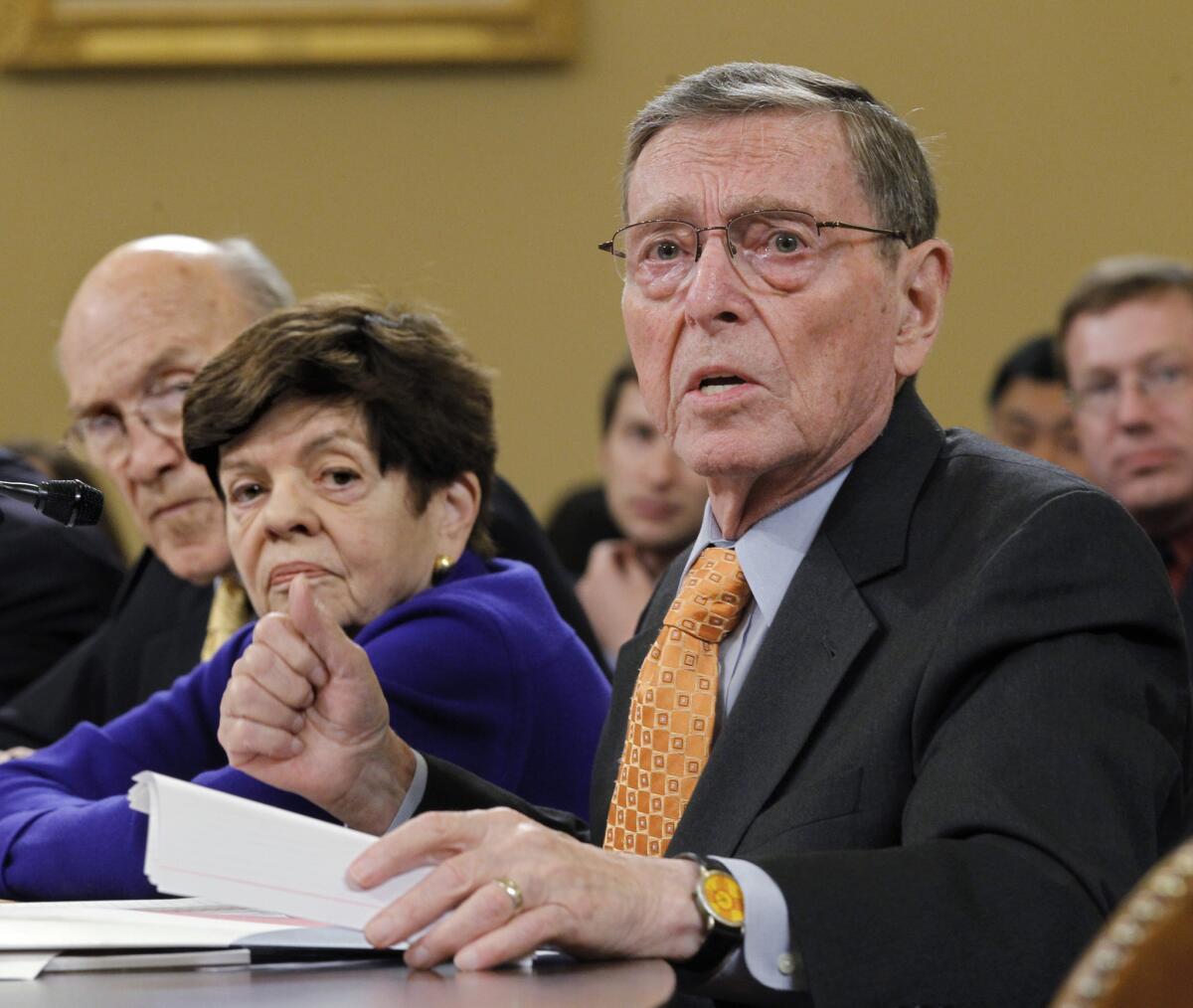An honor for Alice Rivlin roils Social Security faithful

Robert M. Ball is one of the most revered figures in Social Security history, a man whose devotion to safeguarding the program from ideological attacks and political cant over six decades made him the program’s “undisputed spiritual leader.”
Alice M. Rivlin is a distinguished budget expert at the Brookings Institution whose willingness to promote “entitlement reform” (read: cut benefits) as a deficit nostrum has given her a reputation as a danger to Social Security and Medicare.
So when Rivlin was named the ninth recipient of the annual Robert M. Ball Award for Outstanding Achievements in Social Insurance this week, Social Security advocates erupted in fury.
The critics complain that Rivlin’s grasp of social insurance principles is spotty at best. They argue that her tendency to treat Social Security and Medicare as mere expenditure line items to be kneaded into place in a broader deficit policy doesn’t meet the award’s goals; it’s supposed to recognize people who have demonstrated “innovation” or “effectiveness” in furthering public understanding of the programs.
They have a point. It doesn’t help that Rivlin, 82, has affiliated herself with groups funded by hedge fund billionaire Peter G. Peterson, whose hostility to Social Security and Medicare is legendary and who isn’t above using ginned-up panic over government deficits as a weapon.
The main target of the critics’ wrath is the National Academy of Social Insurance, which bestows the award and, as it happens, was founded by Ball. The organization created the Ball award in 2004 to honor Ball on his 90th birthday. (He died in 2008.) Some NASI members are talking about resigning in protest.
“This is not a battle of ideas,” says economist Dean Baker, who fights ceaseless battles to correct public misimpressions fostered by groups of which Rivlin is a member, such as the Peterson-funded “Fix the Debt” campaign. “This is a battle in which the other side routinely lies, cheats and steals to push its agenda.”
As a fiscal expert, Rivlin has a long resume -- she was White House budget director under Bill Clinton, and founding director of the Congressional Budget Office. That’s not the same thing, however, as having progressive credentials in the social insurance world.
Some see the Rivlin award as a sign that NASI itself is turning away from the progressive principles articulated by Ball. “I’m not sure that Bob Ball could get the Bob Ball award today,” says Eric Kingson, who was a member of NASI’s original organizing committee in the 1980s.
William Arnone, a staunch Social Security advocate who chaired the award committee and is NASI’s incoming chairman, told me that he “understands completely” the reaction. He said that although he has “no sense that [Rivlin] wants to gut these programs,” in her deficit-cutting advocacy “she makes a lot of the points that people we know of as the programs’ enemies make.” He says that as committee chairman he was permitted to cast a vote only if the other four panel members tied; but they were unanimous.
Rivlin’s approach to social insurance programs shows how the idea that Social Security and Medicare don’t deserve special treatment as government programs has become mainstream political dogma in Washington.
The best illustration of her viewpoint is the debt reduction plan she concocted in 2010 with former Sen. Pete Domenici (R-N.M.). The document incorporates a few sage prescriptions for Social Security, such as raising the ceiling on earnings subject to the payroll tax and covering all state and local workers.
But it also offers some clunkers, including changing the inflation index for retirees to the “more accurate” chained-CPI -- which isn’t “more accurate” as a measure of inflation for the average retiree and is really just a benefit cut by stealth. Also proposed is a benefit cut for “affluent” retirees -- you have to hunt down the math to discover that “affluent” means people whose lifetime annual earnings were as low as $50,000.
Why make such changes at all, decades before it becomes clear whether they’re even fiscally necessary? Rivlin told a congressional committee this month that enactment of such a package would “demonstrate that our democracy works to solve problems before they reach crisis proportions.”
If there’s a worse rationale for making policy changes to programs that have functioned well for as long as 70 years, good luck finding it.
It’s hard to say if Rivlin is aware of the tumult her honor has caused. She didn’t respond to my call, but an assistant at her Brookings office seemed surprised to hear there was a controversy.
Among some NASI members there’s a feeling that it’s too late to undo the award. But there may be a push to take the award out of the hands of a small committee and make it a choice of the full board, or even of the full voting membership. That might be the best way to ensure that next year’s Ball honoree really is someone who lives up to Ball’s standards.
ALSO:
Don’t cut Social Security -- expand it
Paul Ryan gets Social Security dead wrong
Debunking the five biggest lies about “entitlement” programs
More to Read
Inside the business of entertainment
The Wide Shot brings you news, analysis and insights on everything from streaming wars to production — and what it all means for the future.
You may occasionally receive promotional content from the Los Angeles Times.











